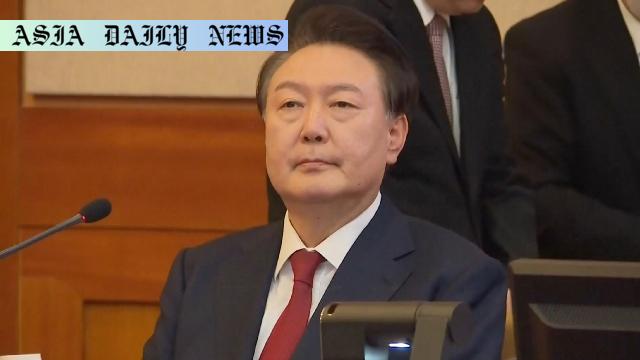Indicted President: South Korean President Yoon Suk-yeol faces insurrection charges after the imposition of martial law.

Introduction: Historic First in South Korea
In a groundbreaking development in South Korean history, President Yoon Suk-yeol has been formally indicted on charges of insurrection. This marks the first instance of a sitting president in South Korea facing criminal charges, bringing significant legal and political turmoil to the nation. Prosecutors allege that Yoon led an insurrection by imposing martial law briefly, which ignited widespread investigations and controversy within the country.
Allegations and the Legal Battle
Yoon Suk-yeol’s troubles began with the imposition of martial law last month, a decision that prosecutors claim was unconstitutional and equivalent to leading an insurrection. Yoon was subsequently detained on January 15 and arrested on January 19. The prosecutors argue that this act violated democratic values and paved the way for insurrection, a grave criminal offense with no immunity for a sitting president. Despite the lack of direct cooperation from Yoon, prosecutors have built their case primarily on evidence and testimonies from other key figures, such as the formerly indicted Defense Minister Kim Yong-hyun.
Yoon’s defense team has sharply criticized these proceedings, labeling his indictment as the ‘worst decision’ and accusing prosecutors of conducting an illegal investigation. The defense maintains that the declaration of martial law, a measure reserved for national emergencies, cannot and should not be equated with insurrection under any legal framework.
The Complexities of Presidential Immunity
South Korea operates under a legal system where sitting presidents typically enjoy immunity from prosecution. However, insurrection is one of the rare exceptions that warrants criminal indictment regardless of the president’s tenure. This legal loophole has placed Yoon at the center of a historic trial, triggering debates on the scope and fairness of such exceptions. The trial also paves the way for the Constitutional Court to determine the validity of his impeachment, adding a layer of complexity to the ongoing political crisis.
Prosecutorial Strategies and Challenges
Prosecutors have faced significant hurdles in pursuing Yoon’s case. Despite twice requesting an extension for his detention, the court declined, compelling them to proceed without direct questioning of the accused. Despite this limitation, prosecutors are confident that the gathered evidence, particularly through their investigation into Kim Yong-hyun, will hold up in court. This unprecedented situation has sparked debates about the effectiveness and fairness of prosecutorial authority in South Korea’s justice system.
Implications for South Korea’s Political Landscape
The indictment of Yoon Suk-yeol has sent shockwaves through South Korea’s political sphere. Public trust in the presidency has been shaken, while political allies and adversaries of Yoon are now divided over the propriety of his actions and the legal proceedings. The case highlights the fragile balance of power within South Korea’s democratic institutions, sparking broader discussions about the role and limits of executive authority in times of crisis.
Conclusion and Future Outlook
The trial of President Yoon Suk-yeol represents a watershed moment for South Korea, testing the resilience of its legal and political frameworks. As the Constitutional Court deliberates on the legality of his impeachment and the criminal trial unfolds, the outcome will set crucial precedents for presidential accountability in the country. Regardless of the verdict, this case is likely to have lasting ramifications on public perceptions and institutional structures in South Korea, offering critical lessons for governance and the rule of law.
Commentary
Confronting a Historic Precedent
The indictment of South Korean President Yoon Suk-yeol undeniably represents an extraordinary and historic moment for the nation. It brings to light not only the question of individual culpability but also the broader issue of how a nation upholds justice when its leader stands accused of grave misconduct. The decision to charge a sitting president highlights the resilience of democratic institutions in holding even the highest offices accountable. However, it also poses the question of whether these mechanisms can operate without creating deeper political instability.
A Test of Justice and Democracy
Yoon’s case is noteworthy for how it underscores the fragility of presidential immunity in South Korea. Although immunity exists to allow leaders to function without fear of constant legal entanglement, exceptions like insurrection emphasize the need for checks and balances, especially when a president’s actions verge on undermining democracy itself. At the same time, the prosecution’s reliance on evidence without direct interrogation raises concerns about due process and procedural fairness, potentially casting doubt on the legitimacy of their case.
Implications Beyond Politics
Beyond immediate political ramifications, this case provides a cautionary tale about the extent of executive power. The invocation of martial law is never a decision taken lightly, yet it is precisely such measures that often invite scrutiny and potential abuse. Yoon’s trial will likely serve as a benchmark for future leaders, reminding them of the fine line between crisis response and overreach. In this sense, the case transcends domestic politics, offering lessons for other democracies grappling with similar dilemmas.
Looking Forward
As South Korea watches this historic case unfold, it becomes clear that the outcome will have a profound impact on its political landscape. Regardless of whether Yoon is found guilty, the trial has already set a precedent for accountability at the highest level. It reinforces the idea that no one is above the law, but it also highlights the importance of fair and transparent judicial proceedings. Ultimately, the hope is that this chapter will strengthen the rule of law in South Korea and safeguard its democracy for generations to come.


